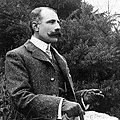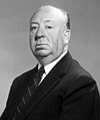Portal:England
The England portal

| |
England is a country that is part of the United Kingdom. The country is located on the island of Great Britain, of which it covers roughly 62%, and over 100 smaller adjacent islands. It has land borders with Scotland to the north and Wales to the west, and is otherwise surrounded by the North Sea to the east, the English Channel to the south, the Celtic Sea to the south-west, and the Irish sea to the west. Continental Europe lies to the south-east, and Ireland to the west. The population was 56,490,048 at the 2021 census. London is both the largest city and the capital.
The area now called England was first inhabited by modern humans during the Upper Paleolithic, but takes its name from the Angles, a Germanic tribe who settled during the 5th and 6th centuries. England became a unified state in the 10th century and has had a significant cultural and legal impact on the wider world since the Age of Discovery, which began during the 15th century. The Kingdom of England, which included Wales after 1535, ceased being a separate sovereign state on 1 May 1707 when the Acts of Union put the terms agreed in the Treaty of Union the previous year into effect; this resulted in a political union with the Kingdom of Scotland that created the Kingdom of Great Britain.
England is the origin of many well known worldwide exports, including the English language, the English legal system (which served as the basis for the common law systems of many other countries), association football, and the Church of England; its parliamentary system of government has been widely adopted by other nations. The Industrial Revolution began in 18th-century England, transforming its society into the world's first industrialised nation. England is home to the two oldest universities in the English-speaking world: the University of Oxford, founded in 1096, and the University of Cambridge, founded in 1209. Both universities are ranked among the most prestigious in the world.
England's terrain chiefly consists of low hills and plains, especially in the centre and south. Upland and mountainous terrain is mostly found in the north and west, including Dartmoor, the Lake District, the Pennines, and the Shropshire Hills. The country's capital is London, the greater metropolitan of which has a population of 14.2 million as of 2021, representing the United Kingdom's largest metropolitan area. England's population of 56.3 million comprises 84% of the population of the United Kingdom, largely concentrated around London, the South East, and conurbations in the Midlands, the North West, the North East, and Yorkshire, which each developed as major industrial regions during the 19th century. (Full article...)
The Battle of Bosworth or Bosworth Field (/ˈbɒzwərθ/ BOZ-wərth) was the last significant battle of the Wars of the Roses, the civil war between the houses of Lancaster and York that extended across England in the latter half of the 15th century. Fought on 22 August 1485, the battle was won by an alliance of Lancastrians and disaffected Yorkists. Their leader Henry Tudor, Earl of Richmond, became the first English monarch of the Tudor dynasty by his victory and subsequent marriage to a Yorkist princess. His opponent Richard III, the last king of the House of York, was killed during the battle, the last English monarch to die in combat. Historians consider Bosworth Field to mark the end of the Plantagenet dynasty, making it one of the defining moments of English history.
Richard's reign began in 1483 when he ascended the throne after his twelve-year-old nephew, Edward V, was declared illegitimate. The boy and his younger brother Richard soon disappeared, and their fate is a mystery still today. Across the English Channel Henry Tudor, a descendant of the greatly diminished House of Lancaster, seized on Richard's difficulties and laid claim to the throne. Henry's first attempt to invade England in 1483 foundered in a storm, but his second arrived unopposed on 7 August 1485 on the southwest coast of Wales. Marching inland, Henry gathered support as he made for London. Richard hurriedly mustered his troops and intercepted Henry's army near Ambion Hill, south of the town of Market Bosworth in Leicestershire. Lord Stanley and Sir William Stanley also brought a force to the battlefield, but held back while they decided which side it would be most advantageous to support, initially lending only four knights to Henry's cause; these were: Sir Robert Tunstall, Sir John Savage (nephew of Lord Stanley), Sir Hugh Persall and Sir Humphrey Stanley. Sir John Savage was placed in command of the left flank of Henry's army. (Full article...)Selected article -
Florence Nightingale OM RRC DStJ (/ˈnaɪtɪŋɡeɪl/; 12 May 1820 – 13 August 1910) was an English social reformer, statistician and the founder of modern nursing. Nightingale came to prominence while serving as a manager and trainer of nurses during the Crimean War, in which she organised care for wounded soldiers at Constantinople. She significantly reduced death rates by improving hygiene and living standards. Nightingale gave nursing a favourable reputation and became an icon of Victorian culture, especially in the persona of "The Lady with the Lamp" making rounds of wounded soldiers at night.
Recent commentators have asserted that Nightingale's Crimean War achievements were exaggerated by the media at the time, but critics agree on the importance of her later work in professionalising nursing roles for women. In 1860, she laid the foundation of professional nursing with the establishment of her nursing school at St Thomas' Hospital in London. It was the first secular nursing school in the world and is now part of King's College London. In recognition of her pioneering work in nursing, the Nightingale Pledge taken by new nurses, and the Florence Nightingale Medal, the highest international distinction a nurse can achieve, were named in her honour, and the annual International Nurses Day is celebrated on her birthday. Her social reforms included improving healthcare for all sections of British society, advocating better hunger relief in India, helping to abolish prostitution laws that were harsh for women, and expanding the acceptable forms of female participation in the workforce. (Full article...)General images
Led Zeppelin were an English rock band formed in London in 1968. The group comprised vocalist Robert Plant, guitarist Jimmy Page, bassist and keyboardist John Paul Jones, and drummer John Bonham. With a heavy, guitar-driven sound, they are cited as one of the progenitors of hard rock and heavy metal, although their style drew from a variety of influences, including blues and folk music. Led Zeppelin have been credited as significantly impacting the nature of the music industry, particularly in the development of album-oriented rock (AOR) and stadium rock.
Originally named the New Yardbirds, Led Zeppelin signed a deal with Atlantic Records that gave them considerable artistic freedom. Initially unpopular with critics, they achieved significant commercial success with eight studio albums over ten years. Their 1969 debut, Led Zeppelin, was a top-ten album in several countries and featured such tracks as "Good Times Bad Times", "Dazed and Confused" and "Communication Breakdown". Led Zeppelin II (1969) was their first number-one album, and yielded "Whole Lotta Love" and "Ramble On". In 1970, they released Led Zeppelin III which featured "Immigrant Song". Their untitled fourth album, commonly known as Led Zeppelin IV (1971), is one of the best-selling albums in history with 37 million copies sold. The album includes "Black Dog", "Rock and Roll" and "Stairway to Heaven", with the latter being among the most popular and influential works in rock history. Houses of the Holy (1973) yielded "The Song Remains the Same" and "Over the Hills and Far Away". Physical Graffiti (1975), a double album, featured "The Rover" and "Kashmir". (Full article...)Did you know?

- ...that Mary Somerville was the first to sign John Stuart Mill's petition to give women the right to vote?
- ...that William the Conqueror's transport of over 2000 horses across the English Channel during the Norman invasion of England is depicted in the Bayeux Tapestry?
- ...that the Premier League's proposal to play some matches outside England was condemned by the Football Supporters' Federation as an "outrageous desecration of the national game"?
In the news

- 4 May 2024 – 2024 London mayoral election
- Sadiq Khan wins re-election as mayor of London, England, with 43.8% of the vote, becoming the first London mayor to be elected to a third term. (BBC News)
- 30 April 2024 – 2024 Hainault sword attack
- A man attacks people with a sword after crashing a car into a house in Hainault, London, England, United Kingdom, killing a 14-year-old boy and injuring four other people, including two police officers. (BBC News) (The New York Times)
- 17 April 2024 –
- Scientists announce that they have identified fossil remains of the Ichthyotitan, the largest marine reptile currently known, in the Westbury Formation in England. (NOS)
Selected featured content
Categories
Selected quotes
| “ | England... is a nation of shopkeepers | ” |
- — Napoleon
Related WikiProjects
England • Bedfordshire • Brighton • Cheshire • Cornwall • Derbyshire • Dorset • Greater Manchester • Hampshire • Lincolnshire • London • Merseyside • Northamptonshire • North East England • Sheffield • Surrey. Warwickshire • West Midlands • Worcestershire • Yorkshire
Topics
Things you can do

- Please visit the English Wikipedians' notice board and help to write new England-related articles, and expand and improve existing ones.
- Visit Wikipedia:WikiProject England/Assessment, and help out by assessing unrated English articles.
- Add the Project Banner to English articles around Wikipedia.
- Check for announcements and open tasks for ways to improve English related articles.
- Help nominate and select new content for the England portal.
- Requested articles: Charterhouse Lane • Renewable energy in England • Ealing Village
- Expand: Dorothy Boyd • David Troughton
Related Portals
 |
 |
 |
 |
 |
 |
 |
 |
| East Midlands | London | North East | North West | South East | South West | West Midlands | Yorkshire and the Humber |

|

|

|

|

|
| Ireland | Northern Ireland | Scotland | United Kingdom | Wales |
Associated Wikimedia
The following Wikimedia Foundation sister projects provide more on this subject:
-
Commons
Free media repository -
Wikibooks
Free textbooks and manuals -
Wikidata
Free knowledge base -
Wikinews
Free-content news -
Wikiquote
Collection of quotations -
Wikisource
Free-content library -
Wikiversity
Free learning tools -
Wikivoyage
Free travel guide -
Wiktionary
Dictionary and thesaurus



































































![Image 64The Staffordshire Hoard is the largest hoard of Anglo-Saxon gold and silver metalwork yet found[update]. It consists of almost 4,600 items and metal fragments. (from Culture of England)](http://upload.wikimedia.org/wikipedia/commons/thumb/6/60/Staffordshire_hoard_annotated.jpg/120px-Staffordshire_hoard_annotated.jpg)



































